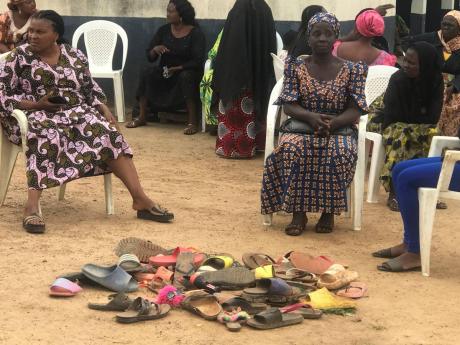After captivity, students seek overseas education
LAGOS (AP):
Emmanuel Benson was planning to get his diploma in horticulture and landscaping from Nigeria’s Federal College of Forestry Mechanization next year. Now, he is not willing to risk the return to school after he was kidnapped by bandits with dozens of others earlier this year.
“Our lives are at risk – Nigerian students, especially in Kaduna state where we are,” the 24-year-old said. As much as he wanted to complete his studies “the kidnapping and everything that is going on haven’t stopped yet ... staying here anymore doesn’t benefit anybody”.
Benson is among a growing group of Nigerian students seeking alternative solutions to their education that won’t further endanger them as bandits in Nigeria’s northern states grow more ambitious, staging increased kidnappings of students for ransom.
At least 25 Nigerian students who spent nearly two months in the custody of gunmen in the country’s troubled northwest region are now putting resources together in the hopes of leaving the West African nation to study in another country, like the US, according to teachers and parents at the Federal College of Forestry Mechanization in the state of Kaduna.
Some of the students, as well as parents and teachers at the Kaduna college, told The Associated Press that after spending about seven weeks in captivity before regaining freedom in May, life hasn’t remained the same. They fear pursuing an education in Nigeria, and they are now relying on the help of a school committee overseeing their application process for overseas education.
There are no clear plans yet on how that enrollment would work out except that they are hoping for scholarship opportunities in the US or elsewhere.
Nigeria is no longer an option for them because “the country is not safe,” according to Paul Yahaya, one of the 25 students.
Many families in Kaduna state say they now stay mostly indoors over fears of attacks. Ransoms are hefty, and in Nigeria, with a national poverty rate of 40 per cent, parents are struggling.
“Even the parents don’t have money because they have been struggling to pay their (abducted children’s) ransom and they paid (so) much amount to the negotiators (who helped to secure the release of the children),” said Abdullahi Usman, the chairman of the committee of parents and teachers who is overseeing the application process for interested students.
If the students left, that would mean starting tertiary education afresh and losing at least three years spent so far for some.
The 25 students hoping to leave are among 1,436 students who have been abducted in the last year in Africa’s most populous country, according to Peter Hawkins, the UN Children’s Agency Nigeria representative. The education of up to 1.3 million Nigerian children has been affected because of the school abductions, he said.

